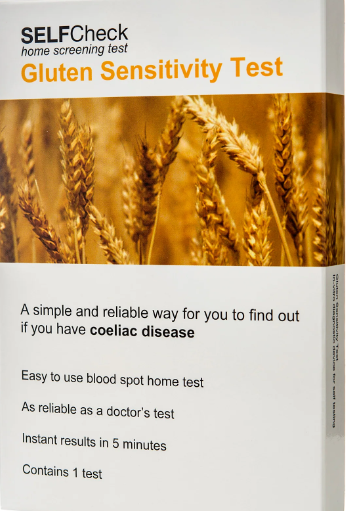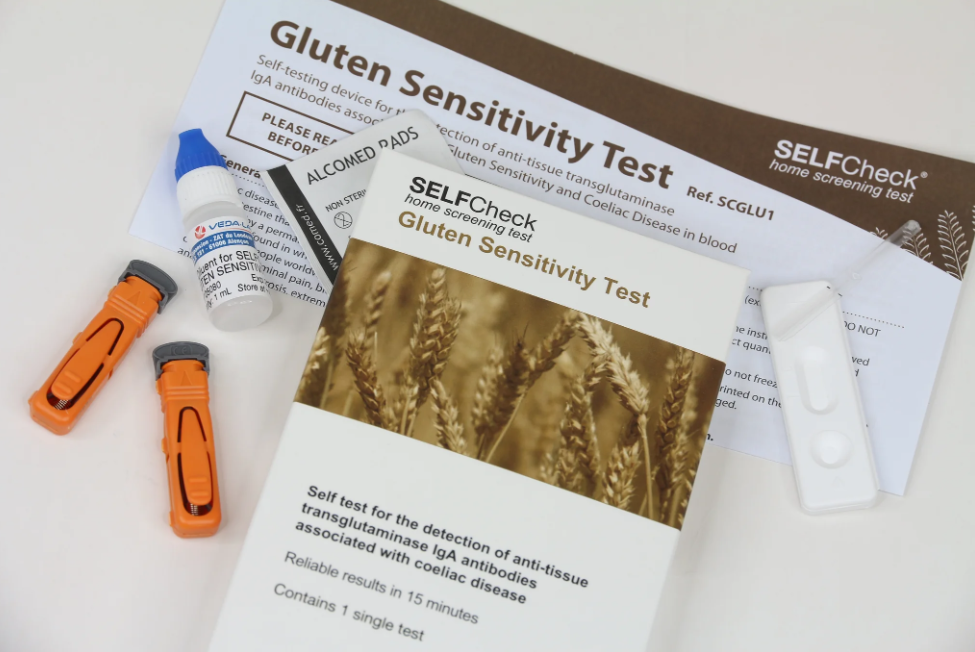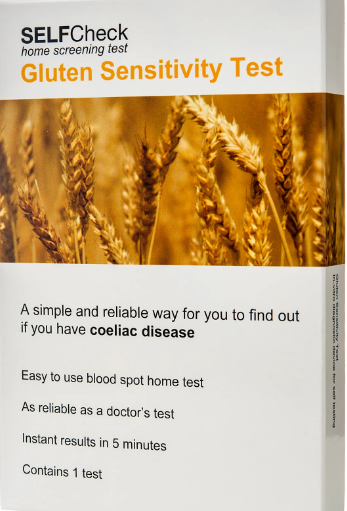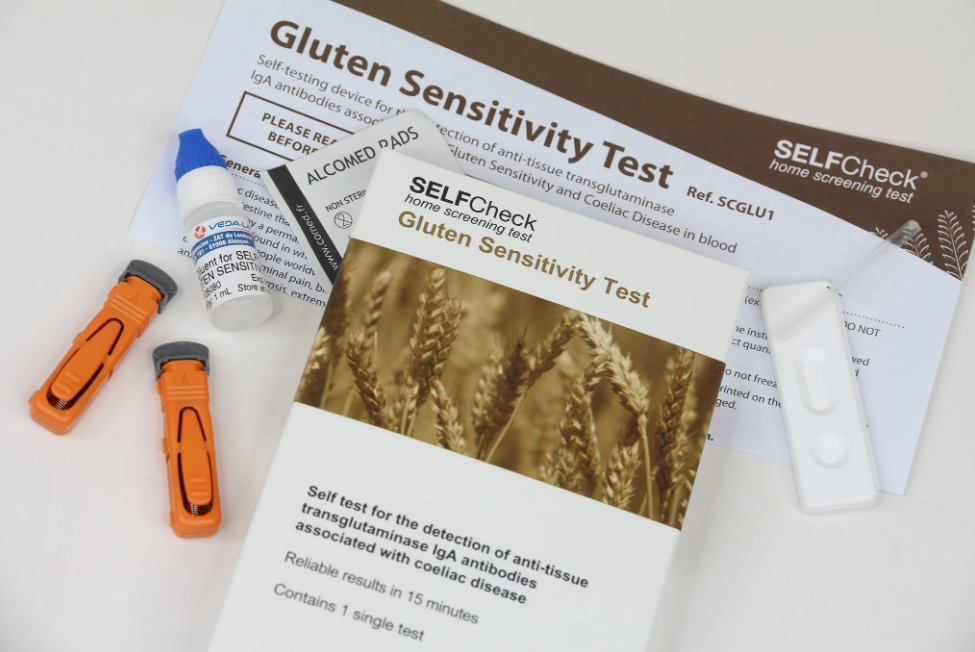If you suspect that you have gluten intolerance or coeliac disease, it's essential to get tested to confirm your condition. Recognizing the signs and symptoms of gluten intolerance is a good starting point to determine if you need to undergo testing. These symptoms can vary in severity and may include digestive problems like bloating, stomach pain, constipation or diarrhoea, as well as joint and muscle pain, fatigue, mouth sores, headaches, depression and anxiety.
The SELFCHECK Gluten Sensitivity Test is a simple and effective test that you can use at home to determine if you have coeliac disease. This test kit is designed specifically for coeliac disease and requires only a small blood sample from a finger prick. The test detects tissue transglutaminase IgA antibodies (tTG IgA) in the blood, which are specific to coeliac disease. The results of the test are available within 10 minutes, and they are easy to read.
- The SELFCHECK Gluten Sensitivity Test is highly accurate
- Has a reliability rate of more than 97% compared to laboratory tests
Your results are easy to read:
- If the test shows one line in the test cassette window, this indicates a negative result, meaning that no tTG IgA antibodies have been detected, and it's unlikely that you have coeliac disease.
- If the test shows two lines in the test cassette window, this indicates a positive result, meaning that a high level of tTG IgA antibodies is present, and it's likely that you have coeliac disease. However, it's essential to speak with your doctor before starting a gluten-free diet because a gluten-free diet can cause false-negative results in both blood tests and biopsy.
Coeliac disease affects approximately 1 in 100 people in the UK, and the symptoms are similar to those of irritable bowel syndrome (IBS). Therefore, if you're experiencing any symptoms of gluten intolerance or IBS, it's crucial to get tested to rule out coeliac disease. With the SELFCHECK Gluten Sensitivity Test, you can quickly and easily determine if you have coeliac disease and take the necessary steps to manage your condition.
Contains 1 test.
- It is important to consult with a doctor if you have concerning symptoms
- To obtain a reliable result, it is necessary to be on a normal gluten-containing diet
- The product is not suitable for children under the age of six.
SELFCHECK offers direct ordering for their products.
- They provide expert customer services.
- The SELFCHECK tests are assembled in their UK labs.
- Their tests provide reliable results at home in just a few minutes.
- The tests are clinically proven and CE certified.
- SELFCHECK uses the same components as those used in hospital tests.
- Their tests are as reliable as a doctor's test.
- SELFCHECK is a supplier of laboratory diagnostics to NHS and research institutions.
About coeliac disease
Coeliac disease, pronounced Sea-Lee-Yak, is a chronic autoimmune disorder affecting the gastrointestinal system. It should not be confused with a food allergy or wheat intolerance, as it involves a permanent intolerance to gluten, a protein mixture found in wheat, barley, and rye. Symptoms of coeliac disease may vary between individuals, but can include diarrhoea, bloating, flatulence, weight loss, malnutrition, and skin problems. The only known treatment for coeliac disease is to strictly follow a gluten-free diet, avoiding any food or beverage containing wheat, barley, or rye to prevent triggering symptoms.
The main symptoms of coeliac disease are similar to, and often confused with irritable bowel syndrome (IBS);
- Coeliac disease and irritable bowel syndrome (IBS) have similar symptoms.
- Bloating is a common symptom of both conditions.
- Flatulence, abdominal pain, and diarrhoea are also shared symptoms.
- Because of this symptom overlap, coeliac disease is sometimes misdiagnosed as IBS.
Other possible symptoms of coeliac disease include:
- Fatigue or tiredness
- Unexplained weight loss
- Dermatitis herpetiformis, an itchy rash
- Infertility or recurrent miscarriage
- Nerve damage or neurological symptoms
Here are the key points to remember about testing and diagnosis of coeliac disease:
- High levels of tTG IgA antibodies in the blood are a reliable indicator of coeliac disease. If you receive a positive result, see your GP who may refer you to a gastroenterologist for follow-up tests.
- Do not start a gluten-free diet until your diagnosis is confirmed by a doctor.
- After starting a gluten-free diet, tTG IgA antibody levels in the blood are likely to decrease and may become undetectable after a few weeks.
- If you have been on a strict gluten-free diet for more than a few weeks, doctors recommend reintroducing gluten into your diet for at least six weeks before taking any coeliac disease test.
- IgA deficiency affects around 1 in 600 people and can result in a false-negative tTG IgA test. If you have concerns about your symptoms, speak to your doctor even if you receive a negative result.
- The NICE Guideline NG20 Coeliac Disease provides recommendations for the recognition, assessment, and management of coeliac disease.
Specific serological testing (such as tTG IgA) for coeliac disease should be offered to patients with any of the following;
- Patients with irritable bowel syndrome (IBS) in adults should be offered specific serological testing (such as tTG IgA) for coeliac disease.
- Patients with persistent unexplained abdominal or gastrointestinal symptoms should be offered specific serological testing (such as tTG IgA) for coeliac disease.
- Patients with prolonged fatigue should be offered specific serological testing (such as tTG IgA) for coeliac disease.
- Patients with faltering growth should be offered specific serological testing (such as tTG IgA) for coeliac disease.
- Patients with unexpected weight loss should be offered specific serological testing (such as tTG IgA) for coeliac disease.
- Patients with severe or persistent weight loss should be offered specific serological testing (such as tTG IgA) for coeliac disease.
- Patients with unexplained iron, vitamin B or folate deficiency should be offered specific serological testing (such as tTG IgA) for coeliac disease.
- Patients with type 1 diabetes, at diagnosis, should be offered specific serological testing (such as tTG IgA) for coeliac disease.
- Patients with autoimmune thyroid disease, at diagnosis, should be offered specific serological testing (such as tTG IgA) for coeliac disease.
Serological testing for coeliac disease should also be considered in people with any of the following;
- People with metabolic bone disorder (reduced bone mineral density or osteomalacia) should be considered for serological testing for coeliac disease.
- People with unexplained neurological symptoms (particularly peripheral neuropathy or ataxia) should be considered for serological testing for coeliac disease.
- People with unexplained subfertility or recurrent miscarriage should be considered for serological testing for coeliac disease.
- People with persistently raised liver enzymes with unknown cause should be considered for serological testing for coeliac disease.
- People with dental enamel defects should be considered for serological testing for coeliac disease.
- People with Down's syndrome should be considered for serological testing for coeliac disease.
- People with Turner syndrome should be considered for serological testing for coeliac disease.
It is important to advise people to follow a normal (gluten containing) diet and consume some gluten in multiple meals each day for a minimum of six weeks before testing for coeliac disease, as per the NICE guidelines.
The recommended treatment for coeliac disease is a lifelong gluten-free diet, which should be supervised by a dietitian with expertise in coeliac disease.
References
- Patient information sheet on Selective IgA deficiency. Available at piduk.org.
- NICE guideline NG20 on Coeliac disease: recognition, assessment and management. Available at nice.org.uk.








